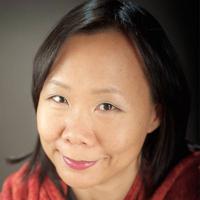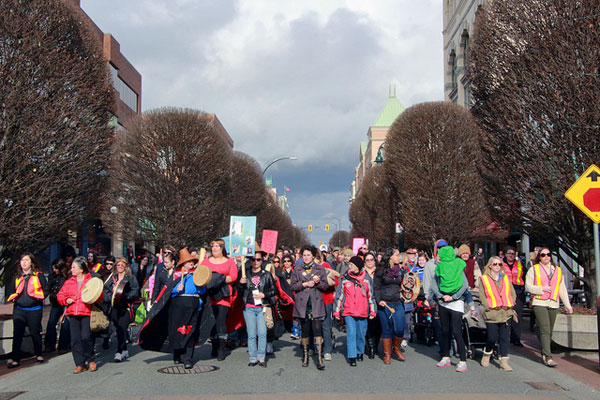Today marks the 24th anniversary of the targeted killing of 14 women engineering students at Montreal's École Polytechnique in 1989. After ordering the male students to leave the classroom, the gunman shot the women who remained and then rampaged through the school, injuring 10 other women and four men. The federal government subsequently declared Dec. 6 the National Day of Remembrance and Action on Violence Against Women. The day commemorates both past and present violence against women with the aim to increase awareness as well as encourage prevention and activism.
The call to address violence against women continues in our own country and abroad. In October, hundreds of people gathered on Ottawa's Parliament hill for an emotional rally organized by the Native Women's Association of Canada to demand a national inquiry on missing Aboriginal women and girls, as one of 216 Sisters in Spirit vigils occurring in cities across Canada and around the world. James Anaya, the United Nations special rapporteur on the rights of indigenous people, echoed their call for an inquiry to look into the estimated 600 First Nations women and girls that have disappeared over the past 20 years, with many more cases that have gone undocumented.
Locally, there have been six cases of reported sexual assault on UBC campus, three of which occurred on consecutive weekends in October. Although a sketch of the suspect was circulated earlier in November, and various security measures have been undertaken on campus, the suspect remains at large. UBC was embroiled in controversies earlier this fall over a rape chant and an insulting "Pocahontas" chant during frosh week by its first year commerce students at the Sauder School for Business. A controversy over a similar rape chant arose at St. Mary's University in Halifax. Various measures were undertaken by administration at both universities.
Internationally, there has been an outcry over the use of sexual violence by the Assad regime in Syria. Women and girls have been used as human shields by the military, and sexually assaulted in government raids and while in detention. Women and girls have been abducted by both regime and opposition forces.
The issue of violence against women encompasses violence perpetrated not only during times of war and social unrest, but also during times of peace by those who are known to their victims. Both situations are rooted in an abuse of power and misogynistic attitudes toward women; both must be identified and addressed for violence against women to be eradicated.
Here are two poems from a B.C. anthology of fiction, nonfiction and poetry by women and men writers on the theme of violence against women, Walk Myself Home: An Anthology to End Violence Against Women. Royalties from the sale of the book go to the B.C. Society of Transition Houses. Caitlin Press donated 150 books to be distributed to each Transition House. The press partnered with the We Can BC Coalition, which works to combat violence against women.
Misogyny
By Yvonne Blomer
During the 17 years of the Vietnam War, it is estimated that 58,000 U.S. service people died.
According to Men's Rape Prevention Project, Washington, DC, in that same 17 year period, 51,000 women were killed, mostly by men they had close relationships with.
Rain fills the gutters; it shatters against panes like particles
of sorrow. This grief we carry, purple and heavy--
bent-limbed umbrella netting rather than repelling.
Men we have loved; women we have loved paired like tin
soldiers: against what we have hated; feared.
These abstracts: black bulbous; red seeping.
I want and I want and I want, wanting does naught.
I love and I love and I love, and then what?
Massacre of women and the murderer kills himself and we are left
looking to blame. It's too easy.
Crows wind-chase sparrow, clear the sky of that
near-geometric shape, leave a shattering of silence.
It seems we know war and death hold hands; but who and when--
well, right from the beginning love to violence:
that plastic groom on the wedding cake hides
his fist, or knife, his cock cocked, his bride
caught up, somehow, in the day and that lingering
doubt, only a shadow; some bird swift overhead.
We love it so much, we make more of it, colour our language
in this violence, so everyday: my son, deathly tired, and that's okay;
he died laughing; so stressed I could have killed--
and then somebody does and now language does and
the wind drives the rain, as if there is no stopping it.
I love and I hate and I want so, what so
just this morning, someone somewhere was raped.
She was killed by someone who I do I do love you.
Copyright © 2010 by Janet Baker. Reprinted from Walk Myself Home: An Anthology to End Violence Against Women with the permission of the author and Caitlin Press.
Les
By Janet Baker
I don't remember my one and only figure-skating solo
there at the Winnipeg Winter Club,
only those moments just before, me
at the boards waiting for the music, knowing
I was in way over my head,
that my pathetic attempt at a "program"
could only be an embarrassment.
I don't remember the music, imagine it was
soaring, and sublimely orchestral,
don't remember it at all, how it went, how it
ended, whether I managed
a spin, a camel, perhaps a three-jump,
whether there was even a ripple
of polite applause. I could do my figure-
eights, was never good at anything else
but if you took lessons, you eventually had
to do a solo. And I don't remember
my role as a king in an operetta called The
Magic Fishbone, but I have evidence,
a black and white photograph of the cast, me
in my kingly regalia, behind us
our shadows, amorphous, hovering, and I have no recall
of my costume or its colour, probably a very
royal maroon, but the stockings are
definitely white, and who knows why I was
playing the king
in an obscure story by Charles Dickens at
7:30 p.m. that December 9th and 10th
and the program doesn't give the year so I
don't know how old I was but I'd guess
around 11, maybe around the same time I
was taking those figure-skating lessons,
maybe even around that time that Les drove
me home, maybe he was driving me home
from a rehearsal, because it was a Junior
Choir production and his daughter's in the
picture too,
but then, why wasn't she in the car, why just
me and Les? And I'm thinking now of my
recurring dream, the one where I'm in a play
and I've lost my script and I can't seem to
borrow one and I haven't learned my lines,
and then I'm on stage, the curtains swinging
open and I'm out there exposed and this is
where the dream always gets blurry. And
maybe my dream is connected to this photo,
the role I can't remember, and maybe
if I could dream about being in the car with
Les, I might remember why
he was driving me home, what happened
after he told me I was old enough,
after he told me he would give me a thrill,
his hand reaching across the front seat
towards my thigh, might remember going home,
remember something besides a streetlight
and that it was near the tracks.
Copyright © 2010 by Janet Baker. Reprinted from Walk Myself Home: An Anthology to End Violence Against Women with the permission of the author and Caitlin Press. ![]()
Read more: Rights + Justice, Gender + Sexuality
















Tyee Commenting Guidelines
Comments that violate guidelines risk being deleted, and violations may result in a temporary or permanent user ban. Maintain the spirit of good conversation to stay in the discussion.
*Please note The Tyee is not a forum for spreading misinformation about COVID-19, denying its existence or minimizing its risk to public health.
Do:
Do not: